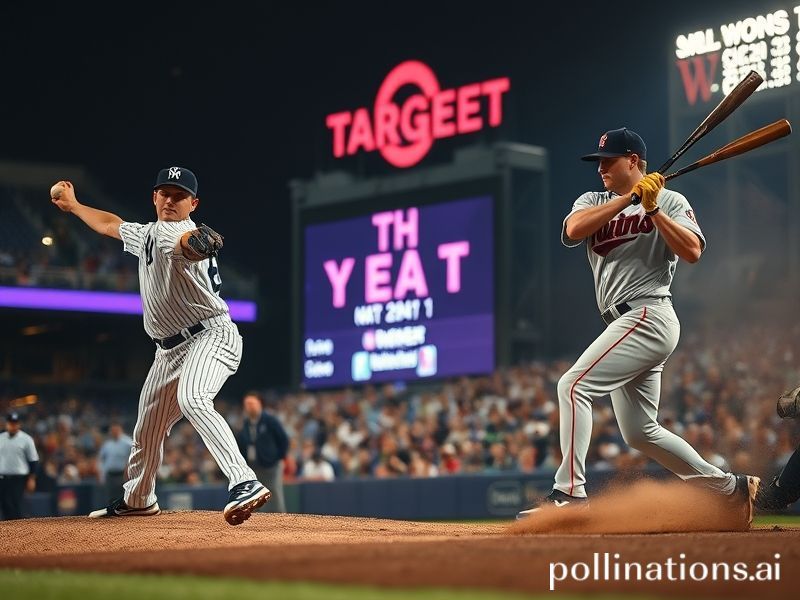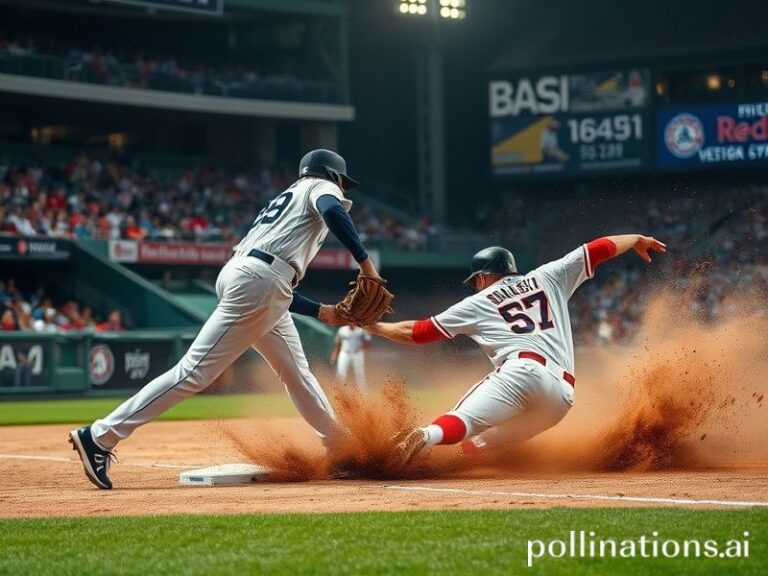Yankees vs Twins: How One Ballgame Quietly Runs the World Economy
Yankees vs Twins: A Ritual of Empire Under Fluorescent Lights
By Our Man in the Cheap Seats, Tokyo Bureau
There is, somewhere in the upper deck of Target Field, a Japanese salaryman in a pin-striped Ichiro jersey who has flown 6,000 miles for the singular pleasure of watching strangers in pajamas swing lumber at a sphere. He is, by any rational metric, insane. Yet he is also the perfect synecdoche for what the rest of us call “the global economy.” Somewhere a London hedge fund is shorting the dollar against the yen, betting (correctly) that the Yankees will win yet again and thereby goose a sneaker sponsorship that props up a Vietnamese factory whose workers will never afford the shoes they stitch. This, dear reader, is how geopolitics is conducted in 2024: via batting averages and broadcast rights.
The New York Yankees—baseball’s answer to late-stage capitalism—versus the Minnesota Twins—baseball’s answer to a regional airline—have faced each other 2,118 times since 1901. The Yankees lead by roughly the gross domestic product of Moldova. Each October, or whenever the schedulers’ Ouija board decrees, the planet tilts slightly on its axis so that satellite dishes from Lagos to Lahore can tune in. The game itself is almost beside the point; what matters is the narrative, the myth that two American zip codes can still summon the world to watch a pastoral pastime played on plastic grass under LED suns.
Europeans, naturally, scoff. They have Champions League matches where fans actually combust from passion. Africans, equally naturally, shrug: the average MLB game lasts longer than a parliamentary coup. Yet both continents still sell the broadcast rights for hard currency, because the Yankees logo travels better than most passports and the Twins—well, somebody has to play the Washington Generals to the Yankees’ Globetrotters. In Singapore’s Changi Airport, duty-free shops sell $300 limited-edition Yankee caps stitched by Bangladeshi teenagers who think “Bronx” is a medieval curse. Globalization is just imperialism with better Wi-Fi.
Consider the rosters: a Dominican shortstop, a Japanese slugger, a Venezuelan fireballer, and—because irony is not dead—a catcher from suburban Minneapolis named Thad. They share nothing except the universal language of arbitration hearings. Their agents speak fluent escrow; their interpreters speak six languages and still can’t translate “designated hitter” into anything the Nobel Committee would recognize. Meanwhile, the Twins front office has perfected the art of selling hope by the kilo, exporting it like artisanal lutefisk to fans who prefer moral victories to actual ones.
The broader significance, if we must pretend there is one, lies in the data exhaust. Every swing, every pitch, every Gatorade spit is harvested, packaged, and sold to hedge funds that model consumer sentiment in Jakarta. The game is merely the loss leader; the real product is behavioral metadata. Somewhere, a quant in Zurich is correlating Aaron Judge’s launch angle to soybean futures, because nothing says “efficient market hypothesis” quite like a 430-foot home run landing on a hedge fund’s risk dashboard. We used to colonize with gunboats; now we do it with exit velocity.
And yet, for all the cynicism, 40,000 Minnesotans will still pack the park, cheeks ruddy with October denial, to watch their lovable underdogs lose with Lutheran stoicism. They will chant “Let’s go Twins” in the same tone one uses to ask for extra napkins—polite, resigned, fatalistic. Across the globe, insomniacs in Seoul will sip instant coffee and wonder why the home team never steals second. The answer, of course, is the same reason your savings account yields 0.3%: risk management has replaced romance.
When the final out is recorded—usually a Twins reliever discovering new frontiers in human disappointment—fireworks will bloom over the Mississippi like a small war. The Japanese salaryman will queue for the light rail, already calculating exchange rates. The hedge fund will be long volatility and short joy. And somewhere in the Bronx, a brass band will play “New York, New York,” because even empires need a theme song. The world will spin on, slightly poorer, slightly wiser, but still inexplicably watching.







